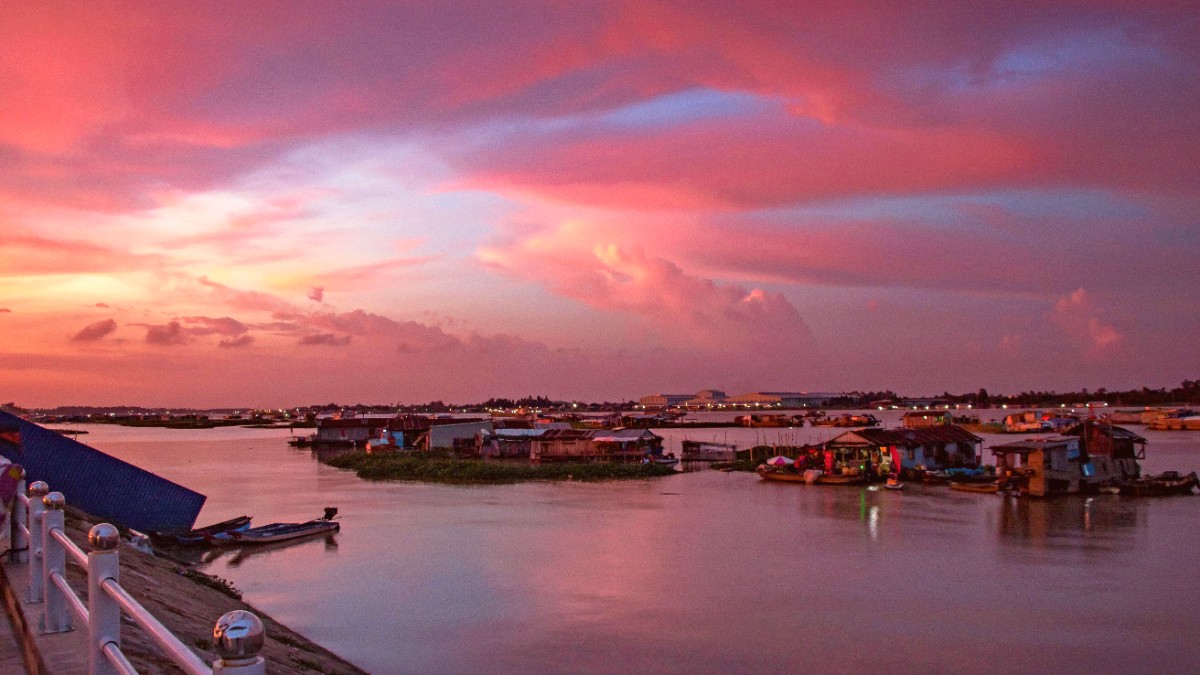
Mekong Delta, Vietnam
Phu Quoc's culinary traditions are heavily influenced by its abundance of fresh seafood. Its cuisine shares characteristics with Southern Vietnamese cuisine but stands out with unique island specialties.
These include its famous fish sauce (Nuoc Mam Phu Quoc) and black pepper. The island's remote location historically fostered a self-sufficient culinary identity, focusing on what the land and sea provided.
Expect an array of fresh seafood, including prawns, squid, crab, various types of fish, sea urchin, and snails. These are often grilled, steamed, or incorporated into noodle dishes.
Vietnamese cuisine features generous use of fresh herbs like mint, basil, and cilantro. Chili, lemongrass, and garlic are prevalent, adding depth and freshness to dishes.
This local black pepper is distinctly aromatic and spicy. It is often served with lime and salt as a dipping sauce for seafood. Phu Quoc Fish Sauce is renowned for its high quality and savory flavor, a core ingredient in Vietnamese dishes. Its production is a significant local industry.
Refreshing salad with fresh herring, lime, onions, chili, and herbs. Served with rice paper, fresh vegetables, and fish sauce dip.
Find it at local seafood restaurants.
Unique Phu Quoc dish with freshly made rice noodles, seafood (squid, fish cake), sometimes pork, in a rich broth. 'Quậy' means 'stir,' for the flavorful sauce.
Look for specialist Bún Quậy restaurants in Duong Dong.
Crabs from Ham Ninh village are famous for their freshness and sweetness. Often simply steamed with salt, pepper, and lime dipping sauce.
Visit Ham Ninh for the freshest experience.
Small, colorful, sweet pastries with mung bean, coconut, or taro fillings. Popular snacks at local markets.
Cà Phê Sữa Đá (Iced coffee with condensed milk), Nước Mía (Fresh sugarcane juice), Nước Dừa (Fresh coconut water), Local Beers (Bia Saigon, 333, Larue).
Tempus Fugit (JW Marriott Phu Quoc): High-end Vietnamese and international cuisine in a stunning setting. The Spice House (Dusit Princess Moonrise Beach Resort): Elevated Vietnamese dishes with fresh ingredients.
Numerous options along Long Beach and in Duong Dong town. They feature fresh seafood, Vietnamese cuisine, and international fare.
Duong Dong Night Market: Largest concentration of street food and seafood stalls. A lively atmosphere and affordable dishes.
These are becoming more common, especially in tourist areas and resorts. Many Vietnamese dishes adapt (e.g., noodle soups with vegetable broth, tofu dishes).
Look for "quán chay" (vegetarian eateries), though these are fewer than on the mainland.
Very limited. It is best to stick to fresh seafood and vegetarian options.
Some international hotels might cater to these needs upon request, but confirm in advance.
This can be challenging in local eateries. Many sauces, like fish sauce and soy sauce, contain gluten or other common allergens.
Communicate clearly using translation apps or written notes. Resorts and higher-end restaurants are more likely to understand and accommodate specific requests.
In smaller kitchens, cross-contamination risks exist for severe allergies. Opt for simple dishes.
Carry a small card with your dietary restrictions translated into Vietnamese.
No large-scale food festivals are specifically famous for Phu Quoc. However, local events or celebrations might feature special foods unique to the occasion.
Visit during Tet (Lunar New Year) for traditional rice cakes like Bánh Chưng.
Beyond Bánh Khéo, various sweet soups (chè) are popular. These often feature beans, fruits, and coconut milk.
Fresh fruit is always a good dessert option.
To experience authentic flavors, look for eateries bustling with local customers. Higher-end restaurants usually cater to international tastes.
Opt for freshly cooked food, especially at street stalls. Look for places with high customer turnover.
Visit pepper plantations to learn about the cultivation process. Many farms feature fresh pepper products for sale.
Tour a traditional fish sauce factory to see the long fermentation process of the famous sauce.
Visit a sim wine distillery to learn about how the local rose myrtle fruit is processed into a sweet, distinctive wine.
Always opt for freshly cooked food, especially at street stalls. High turnover means fresh ingredients.
Look for busy stalls with visible cooking processes.
Wash your hands thoroughly before eating. Carry hand sanitizer, especially when exploring markets.
Drink only bottled water or verified filtered water.
The island’s cuisine heavily features seafood, from grilled prawns to Ham Ninh crabs, seasoned with local spices.
Try Bún Quậy, a flavorful noodle soup, and Gỏi Cá Trích, a refreshing herring salad, unique to Phu Quoc.
Don't miss the chance to taste and buy local Phu Quoc fish sauce, black pepper, and Sim wine directly from producers.
Exploring local markets and street food stalls presents a rich culinary experience. Maintain an open mind for new flavors and textures.